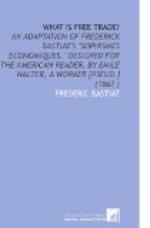A celebrated modern philosopher has added to the categories of Aristotle, the sophism which consists in including in one word the begging of the question. He cites several examples. He should have added the word tributary to his vocabulary. In effect the question is, are purchases made abroad useful or injurious? “They are injurious,” you say. And why? “Because they make us tributary to the foreigner.” Here is certainly a word which presents as a fact that which is a question.
How is this abusive trope introduced into the rhetoric of monopolists?
Some specie goes out of a country to satisfy the rapacity of a victorious enemy—other specie, also, goes out of a country to settle an account for merchandise. The analogy between the two cases is established, by taking account of the one point in which they resemble one another, and leaving out of view that in which they differ.
This circumstance, however,—that is to say, non-reimbursement in the one case, and reimbursement freely agreed upon in the other—establishes such a difference between them, that it is not possible to class them under the same title. To deliver a hundred dollars by compulsion to him who says “Stand and deliver,” or voluntarily to pay the same sum to him who sells you the object of your wishes—truly, these are things which cannot be made to assimilate. As well might you say, it is a matter of indifference whether you throw bread into the river or eat it, because in either case it is bread destroyed. The fault of this reasoning, as in that which the word tribute is made to imply, consists in founding an exact similitude between two cases on their points of resemblance, and omitting those of difference.
CHAPTER XXIII.
CONCLUSION.
All the sophisms we have hitherto combated are connected with one single question: the restrictive system; and, out of pity for the reader, we pass by acquired rights, untimeliness, misuse of the currency, etc., etc.
But social economy is not confined to this narrow circle. Fourierism, Saint-Simonism, communism, mysticism, sentimentalism, false philanthropy, affected aspirations to equality and chimerical fraternity, questions relative to luxury, to salaries, to machines, to the pretended tyranny of capital, to distant territorial acquisitions, to outlets, to conquests, to population, to association, to emigration, to imposts, to loans, have encumbered the field of science with a host of parasitical sophisms, which demand the hoe and the sickle of the diligent economist. It is not because we do not recognize the fault of this plan, or rather of this absence of plan. To attack, one by one, so many incoherent sophisms which sometimes clash, although more frequently one runs into the other, is to condemn one’s self to a disorderly, capricious struggle, and to expose one’s self to perpetual repetitions.




